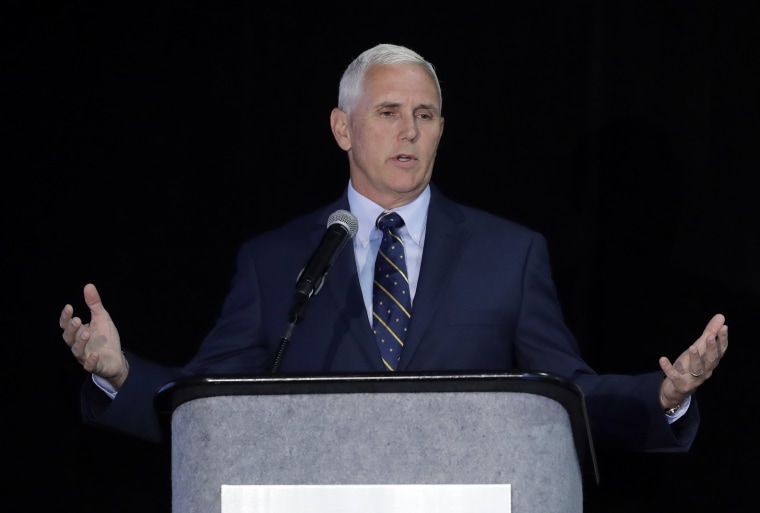In choosing Indiana Gov. Mike Pence as his running mate this fall, Donald Trump adds to his ticket someone who offers a rich background of policy-making and governing experience -– and also carries with him scars from the kinds of ideological fights that electrify social conservatives.
He served in the U.S. House for 12 years, holding leadership positions among movement conservative groups on the Hill; he carried the conservative torch during his first term as Indiana’s governor; and he is admired by the GOP policy wonks and evangelicals who aren’t yet sure if they can stomach Trump.
And, not unlike the bombastic celebrity who will run with, Pence even knows his way around a green room. In conservative media's heyday in the 1990s, Pence worked as a radio and TV host in Indiana, even dubbing himself "Rush Limbaugh on decaf."
But while Pence could help unite a fractured GOP –- and prevent Trump’s foes from launching a full-fledged assault against him at the Republican National Convention next week –- his forays into cultural warfare could also give Democrats plenty of fodder to paint him as a more soft-spoken version of Trump. And the outlines of those attacks have already been crafted by Pence's Democratic rivals in his own state.
RELATED: Trump Chooses Indiana's Mike Pence as Running Mate
Aides and operatives close to Pence describe him as a uniting force in the conservative movement who – despite more than a decade in Washington – has a keen understanding of voter rebellion against the status quo.
Marc Short, a former Pence aide who has since been an adviser to Marco Rubio and to the Koch Brothers network, says Pence recognized the early backlash to Republican governance that gave rise to the Tea Party movement.
“He earned a lot of his stripes after the year 2000, opposing No Child Left Behind, Medicare Part D, TARP and spending in the last decade that gave rise to the Tea Party,” Short said. “Mike was one of the earliest advocates for the Tea Party and his votes reflected frustration in 2010.”
Pence is also viewed as a consensus pick who could help hold together a party divided by its unconventional standard-bearer.
“Mike is one of those people who works very hard to unite to bring people together as a team,” said Jeff Cardwell, Pence’s longtime friend and the state GOP chair, adding that the governor is someone who “can unite and bring people together.”
Pence has been on the national stage before when he became the target of national condemnation last year after signing a controversial “religious freedom” bill that many believed would make it easier to discriminate against LGBT people.
The law, known as the Religious Freedom Restoration Act (RFRA), was written to prohibit any state entity from substantially burdening a person’s religious beliefs, unless that entity could prove it was relying on the least restrictive means possible to further a compelling governmental interest.
It shared the same name as a federal measure that passed with broad, bipartisan support in the early 1990s, and was signed into law by President Bill Clinton. However, opponents of Indiana’s RFRA insisted the law differed a great deal from the federal version, and that the state’s measure would effectively serve as a license to discriminate -- particularly against LGBT people -- on religious grounds.
RELATED: Mike Pence Quick Facts
Several corporations and organizations responsible for pumping millions of dollars into Indiana’s economy were quick to condemn the law last year, and Pence was forced to sign a so-called “fix” that made clear the state’s RFRA could not be used by businesses to discriminate against LGBT patrons. But the “fix” did little to quell the law’s critics, and Indiana still ended up suffering economic consequences as a result of the backlash. According to Visit Indy, Indianapolis’ nonprofit tourism arm, the law might have cost the city as many as 12 conventions and up to $60 million in economic impact.
Pence also stirred uproar in the state over his approval of a stringent abortion measure this March, which was blocked by a federal judge two weeks ago through a preliminary injunction. The law banned abortions performed solely because of the fetus’s race, gender or a disability; it also made the receipt, sale or transfer of fetal tissue a felony. An online backlash under the name “Periods for Pence” has targeted the governor’s support of the law.
While Pence has won accolades from evangelicals nationwide for his stances on social issues, the controversies have left him a deeply polarizing figure in his home state, making his decision to accept a slot as Trump’s running mate a complicated gamble.


